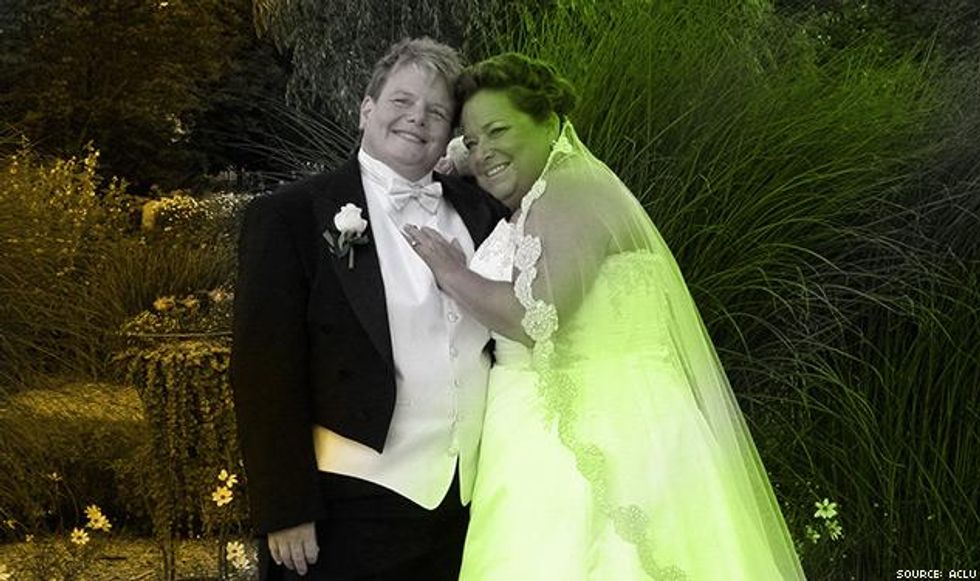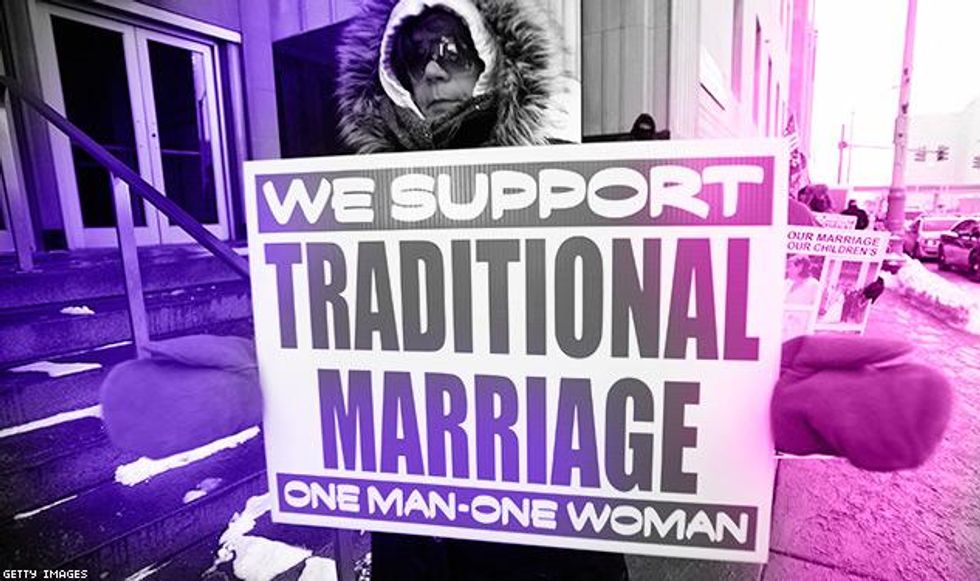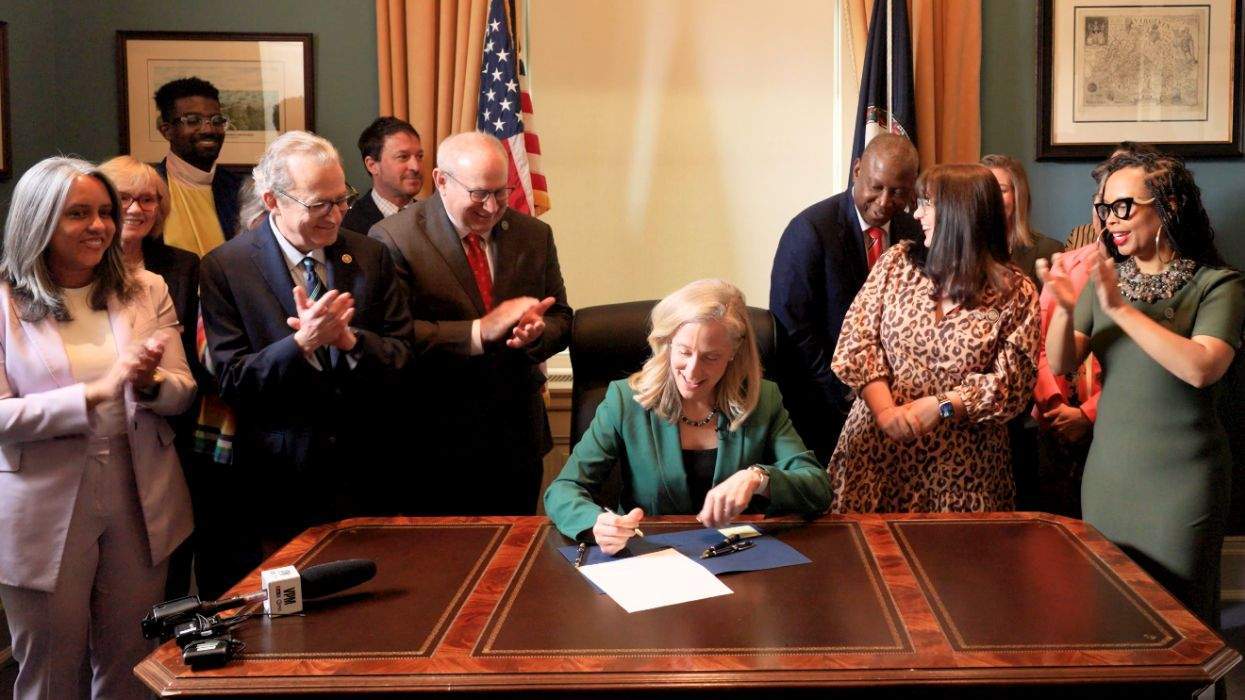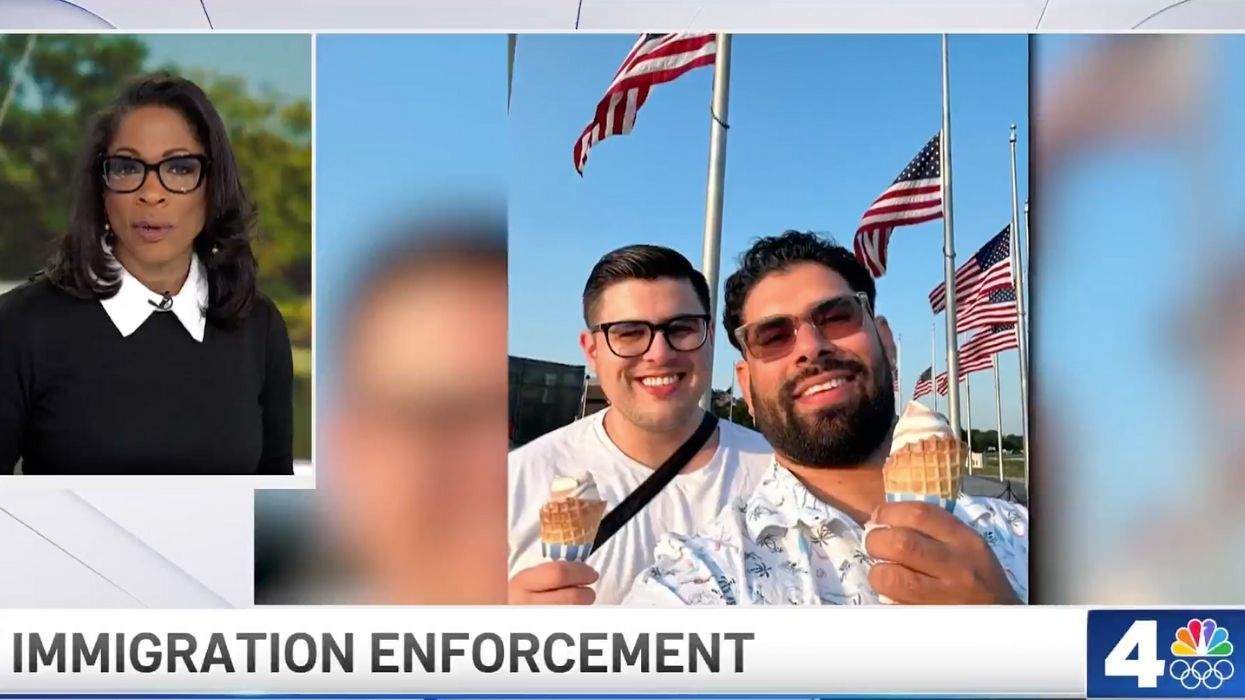The states with marriage equality cases pending before the Supreme Court have filed opening briefs, with strong arguments coming from all four. The plaintiff couples in Tennessee, Michigan, Kentucky, and Ohio now await reply briefs from the states, with oral argument before the court slated for late April.
The new briefs from the plaintiffs provide a glimpse into their strategy for combatting the homophobic claims of state officials, and are a preview of the issues likely to be examined by the Supreme Court.
Most of arguments fall into four categories:

1: The Marriage Bans Serve No Legitimate Interest
One of the primary arguments against the marriage bans in all four states is that the supposed justifications for such laws are completely divorced from reality.
"As an initial matter, the Commonwealth's conception of marriage as a government-run incentive program that channels heterosexuals toward 'responsible procreation' bears no relation to 'the popular understanding of the institution' of marriage 'as it applies to heterosexual couples,'" write the Kentucky plaintiffs.
That's a reference to the explanation offered by the state, which claims that marriage bans encourage heterosexuals to form stronger families. But as more than 60 state and federal courts have already concluded, that has nothing to do with how or why people actually marry. In addition, the Kentucky team points out, "The notion that some children should receive fewer legal protections than others based on the circumstances of their conception is not only irrational; it is constitutionally repugnant."
The Ohio plaintiffs also reject the state's claim that marriage bans will lead to family stability and prevent children from being raised in unstable homes. "Petitioner couples already are married and already are rearing offspring," the brief reads. "Withholding the stability and security that would come from recognition of their marriages does nothing to help the hypothetical children who may have been accidentally conceived by heterosexual couples, but does inflict grave harms on the actual children being raised by married same-sex couples. This rationale is 'so full of holes it cannot be taken seriously.'"
The Tennessee plaintiffs make the same point, but much more bluntly: "Children who are being raised by same-sex couples benefit from the stabilizing force of marriage, just as children of opposite-sex couples do."

2: There's No Reason to "Wait and See" What the Effects of Marriage Equality Are
Some of the states have argued that they should be allowed to ban marriage equality because the effects of equality are, they claimed, still unknown. But most federal courts have rejected this "wait and see" approach, and the plaintiff briefs explain why:
"Kentucky did not enact its 2004 constitutional amendment to 'allow change through customary political processes,'" the plaintiffs write. "Quite the opposite; the co-sponsors of the bill that became the amendment designed it to remove the issue from the reach of the state judiciary and all other 'elected officials,' including those in the 'legislature,' who might wish to allow same-sex couples to marry."
The Ohio plaintiffs write that "defenders of the recognition bans rely on a related set of arguments that all boil down to this: a state majority's desire to withhold marriage rights from same-sex couples is sufficient reason in itself to preserve the ban." But, they add, "A preference for majoritarian lawmaking, however, cannot override the constitutional rights of a minority."
And the Tennessee plaintiffs deny that there's anything "traditional" about the marriage bans at all: "To begin, any purported tradition of refusing to recognize same-sex couples' marriages is actually of very recent vintage. Prior to the 1970s, there were no laws specifically barring same-sex couples from marrying."
3: These Cases Are About "Marriage," Not "Same-Sex Marriage"
The briefs are all careful to draw a distinction between the right to marry versus the right to have a same-sex marriage.
"The question is not whether there is a fundamental right to 'same-sex marriage,'" write the Kentucky plaintiffs. "It is whether the Constitution safeguards a fundamental right to marriage in general. There can be no doubt that it does. Same-sex couples, therefore, 'may seek autonomy for these purposes, just as heterosexual persons do.'" That's a quote from the landmark 2003 Lawrence v. Texas decision, which overturned sodomy bans nationwide on the basis of personal privacy.
The Michigan team's brief also cites important precedent from the 1967 case that struck down bans on interracial marriage: "In Loving, this Court did not examine whether there was a right to 'inter-racial marriage' when it held that '[t]he freedom to marry has long been recognized as one of the vital personal rights essential to the orderly pursuit of happiness by free men.'"
And the Tennessee plaintiffs point out that there are no practical differences between marriage for straight people versus gay people. "Same-sex couples have the same fundamental interests as other couples in the liberty, autonomy, and privacy associated with the freedom to marry, including legal protections, stability, and a loving and nurturing environment in which to raise children," they write. "The interests that form the basis for the fundamental right to marry and to remain married do not turn on the sex of the persons in the marital relationship."

4: The Marriage Bans Impinge on Couples' Freedom to Travel
The Tennessee brief is the only one to take the novel approach of claiming that the marriage bans are unconstitutional because they prevent couples from moving across state lines.
They cite the case Shapiro v. Thomaston to back up the assertion that "The fundamental right to travel guarantees to all citizens the liberty 'to migrate, resettle, find a new job, and start a new life.'"
The brief adds, "Those laws burden married same-sex couples' exercise of that right by rendering their marital status and legal family relationships 'void and unenforceable' as the price of entering Tennessee. ... Tennessee cannot, consistent with the requirements of the Constitution, force a citizen of the United States to 'choose between travel and [a] basic right' of citizenship."

5: The Only Effect of the Marriage Bans Is to Enforce Inequality
At the end of the day, all of the plaintiff groups argue, the marriage bans actually only have one effect: to impose inequality on citizens, and to reinforce the status of same-sex couples as unequal and inferior to opposite-sex couples.
"[Lawmakers'] entire point was to brand marriages of same-sex spouses as unequal," write the Ohio plaintiffs.
The Michigan plaintiffs point out a glaring inequality not only in the marriage bans, but even in the arguments used by the state to justify them: "No other group is required to establish any level of parenting competency in order to be eligible to marry, and groups whose children are known to have less favorable outcomes in life -- including those who are economically disadvantaged, those who have previously been married, and those who already have offspring who have had 'terrible' outcomes -- are entitled to marry," they write.
That's an important point, since one of the false claims made by anti-equality legislators is that LGBT parents are inferior to straight parents. Even if that were true -- and numerous large, reputable studies and the American Psychological Association have confirmed that it's not -- no other group is held to such a standard when considering eligibility to marry.
















